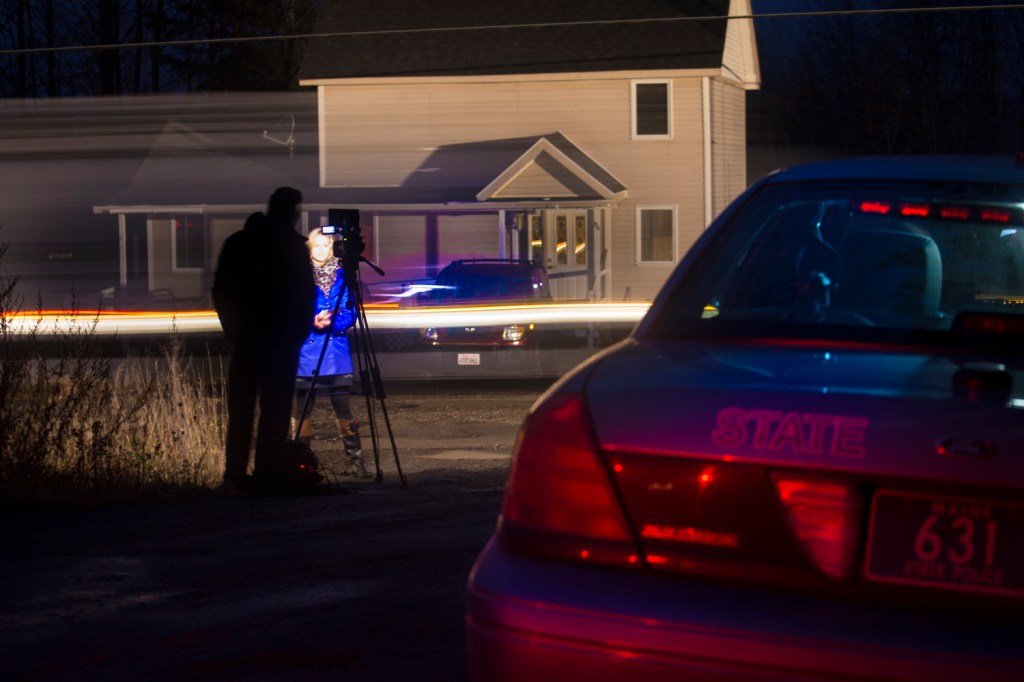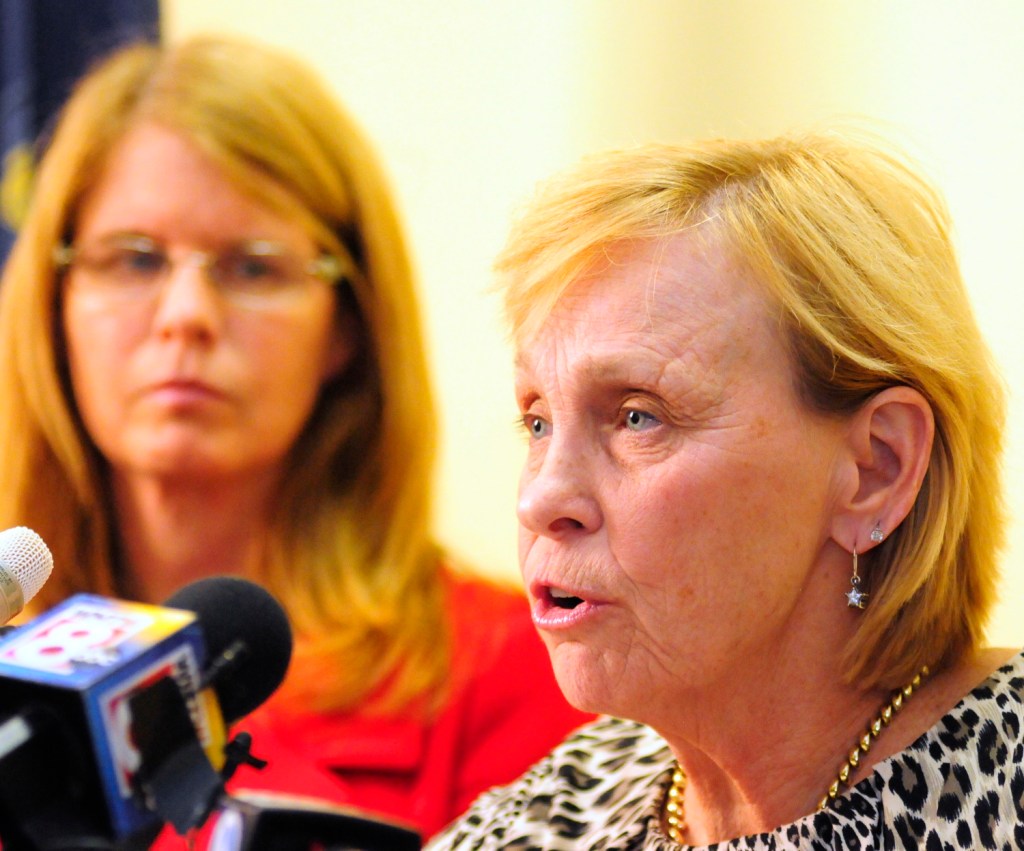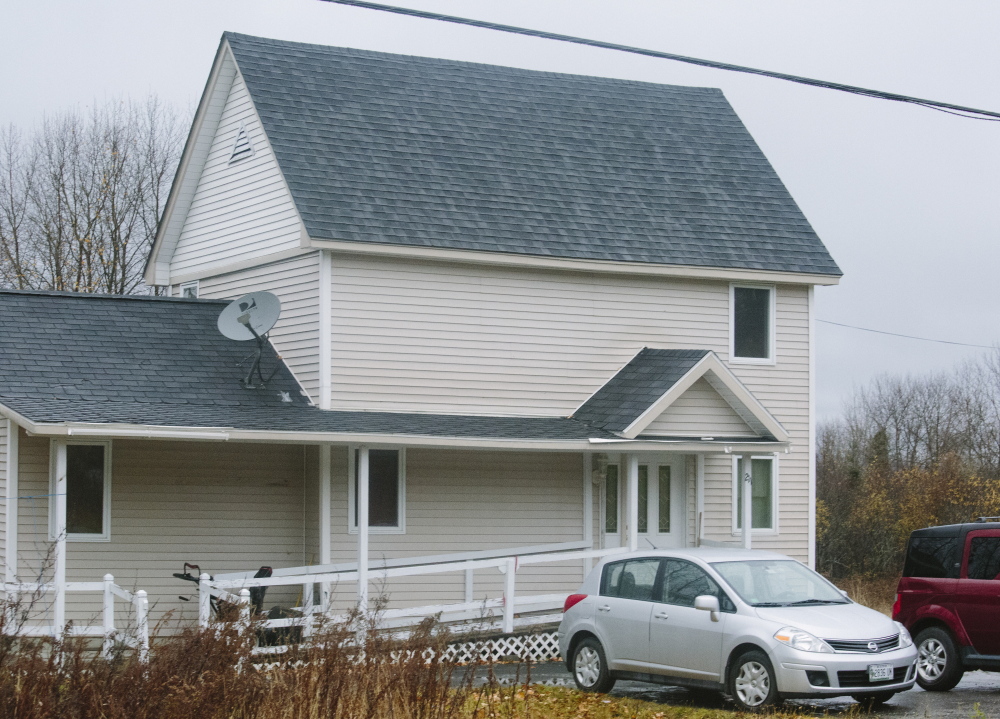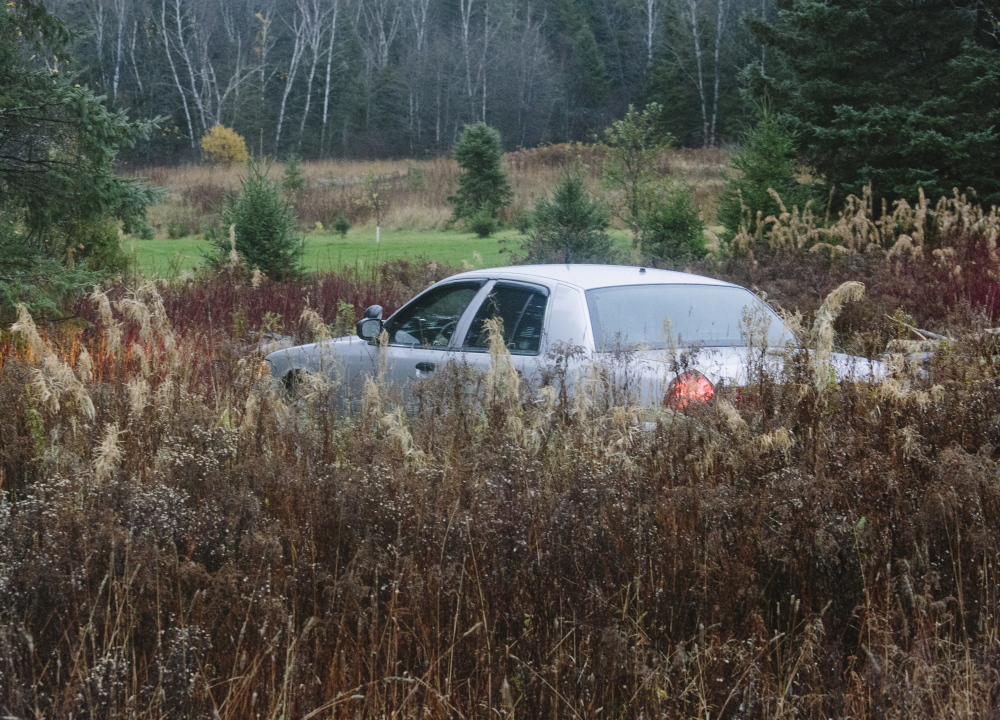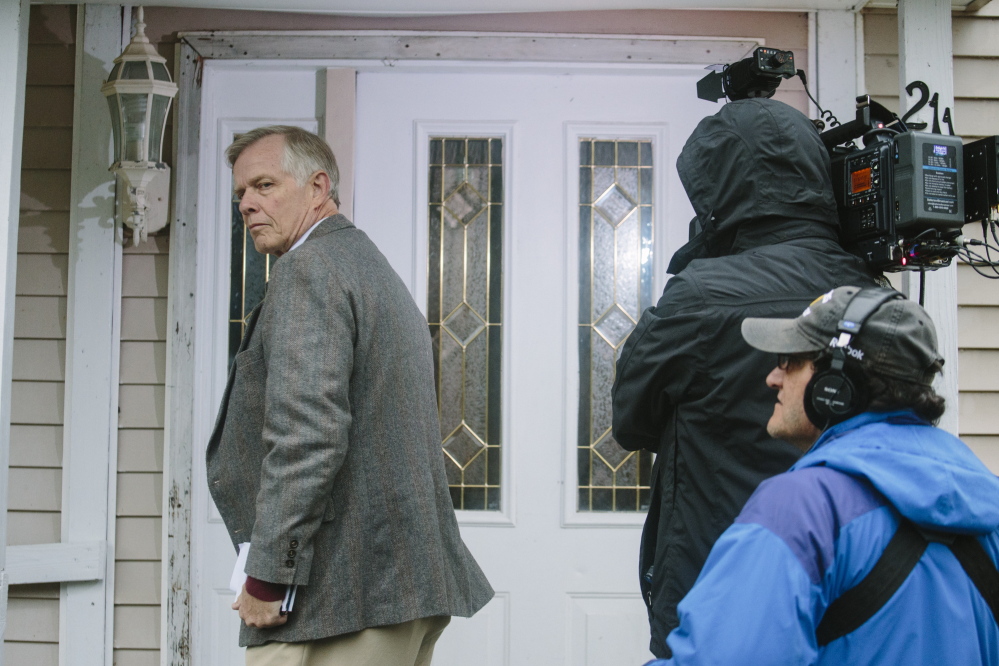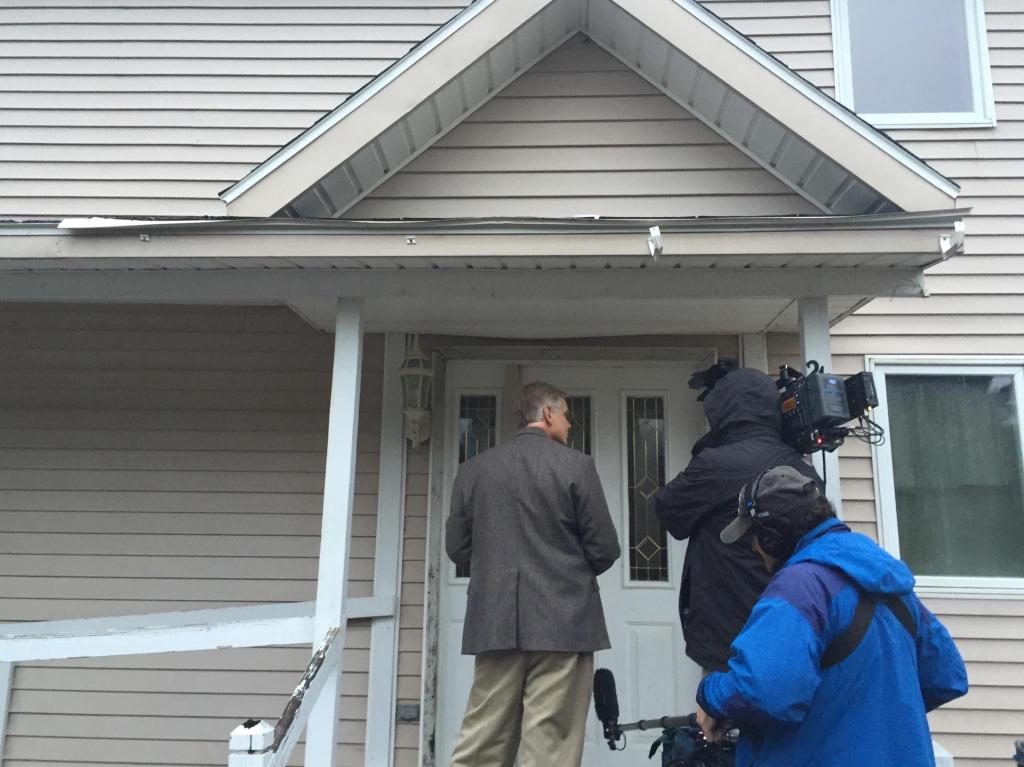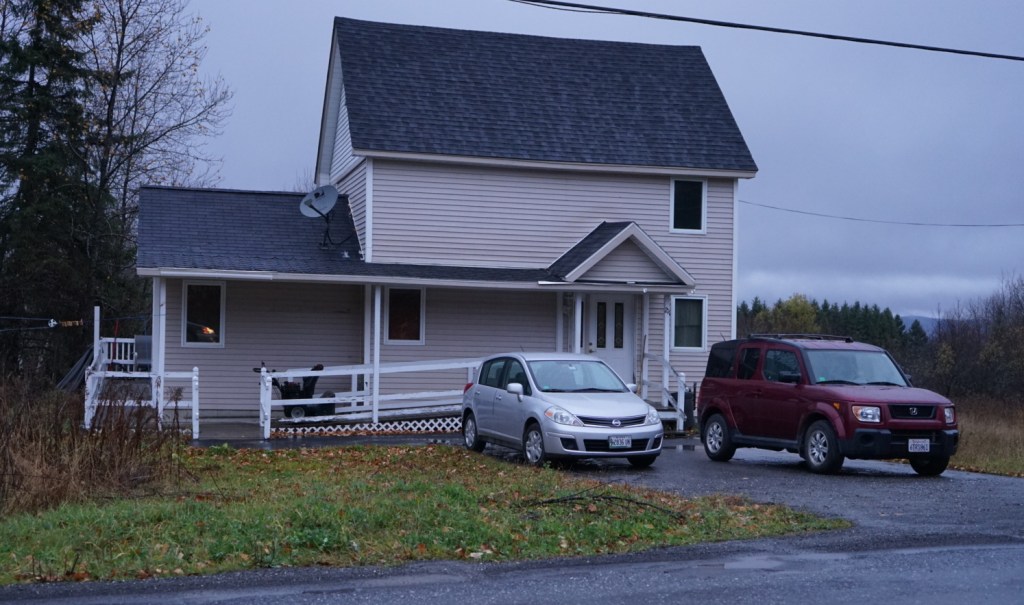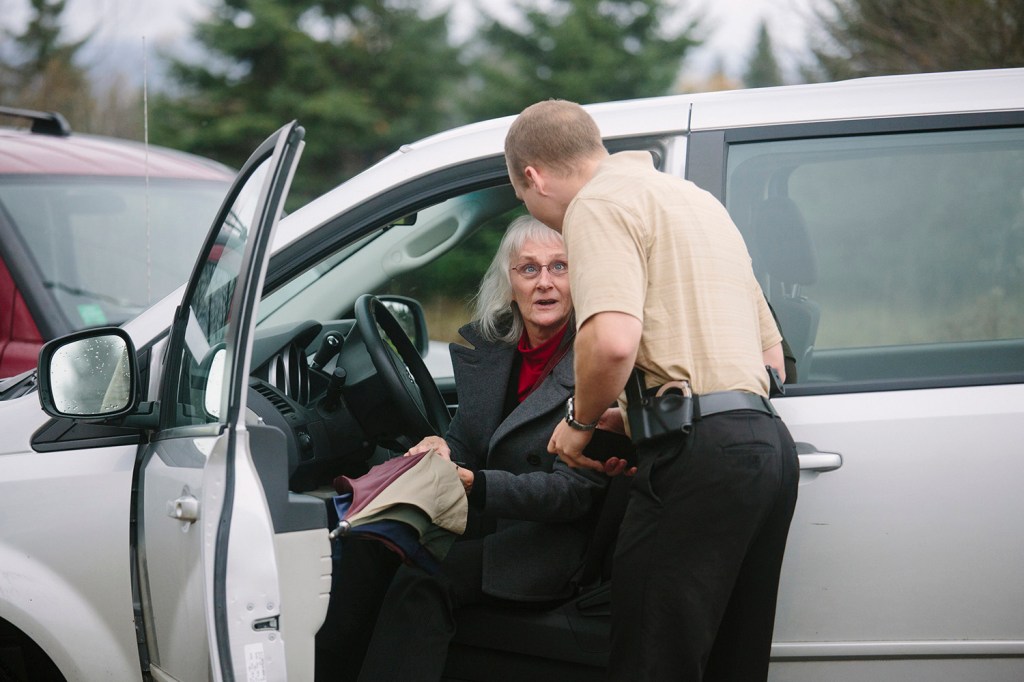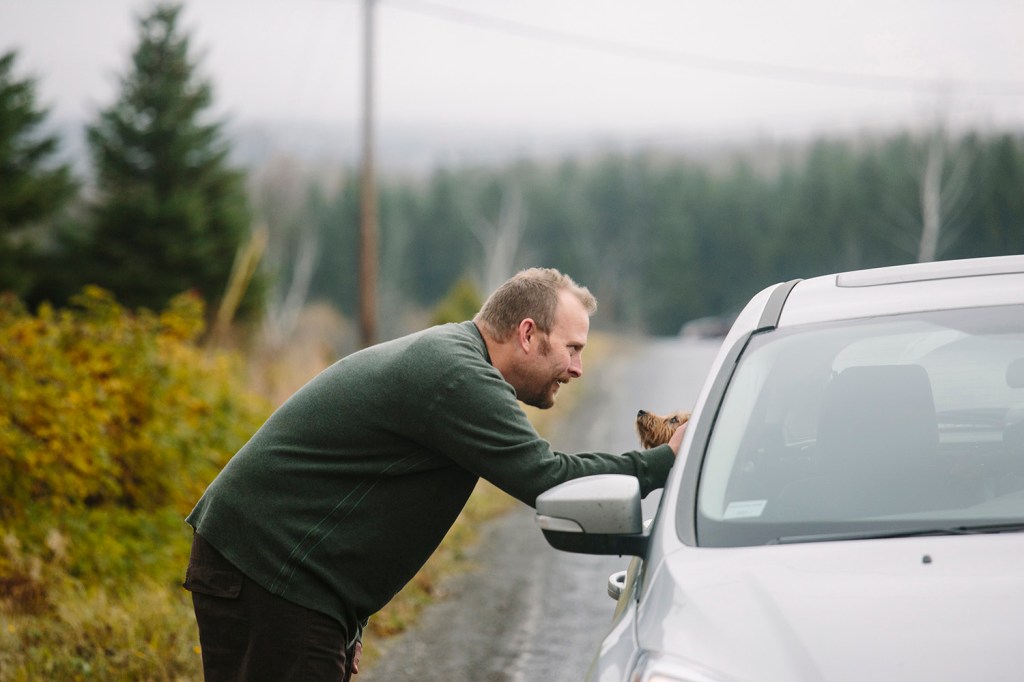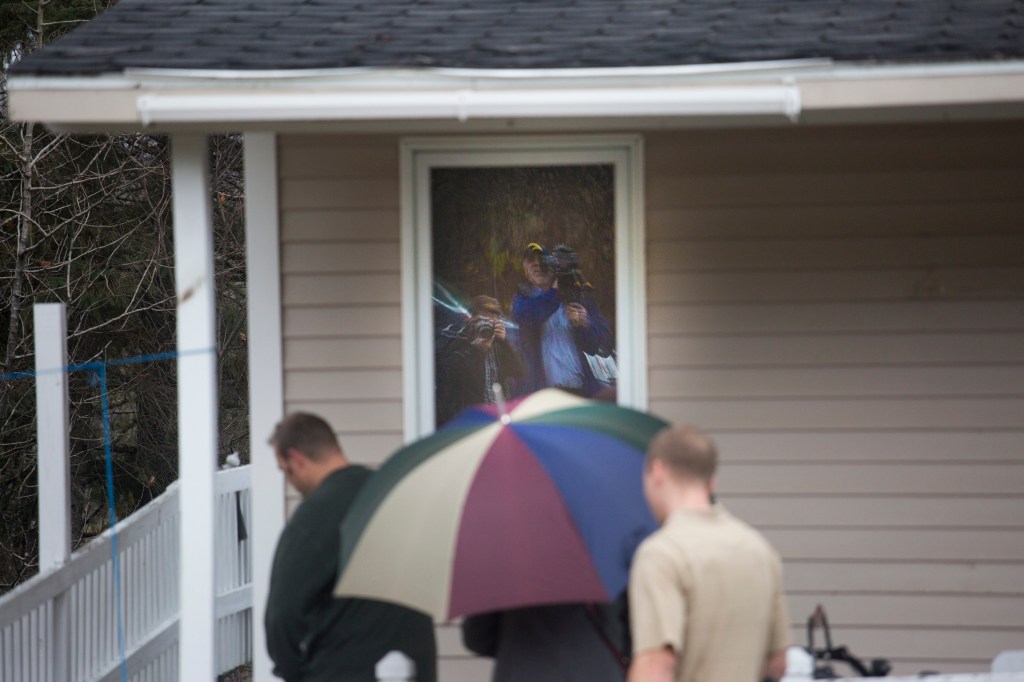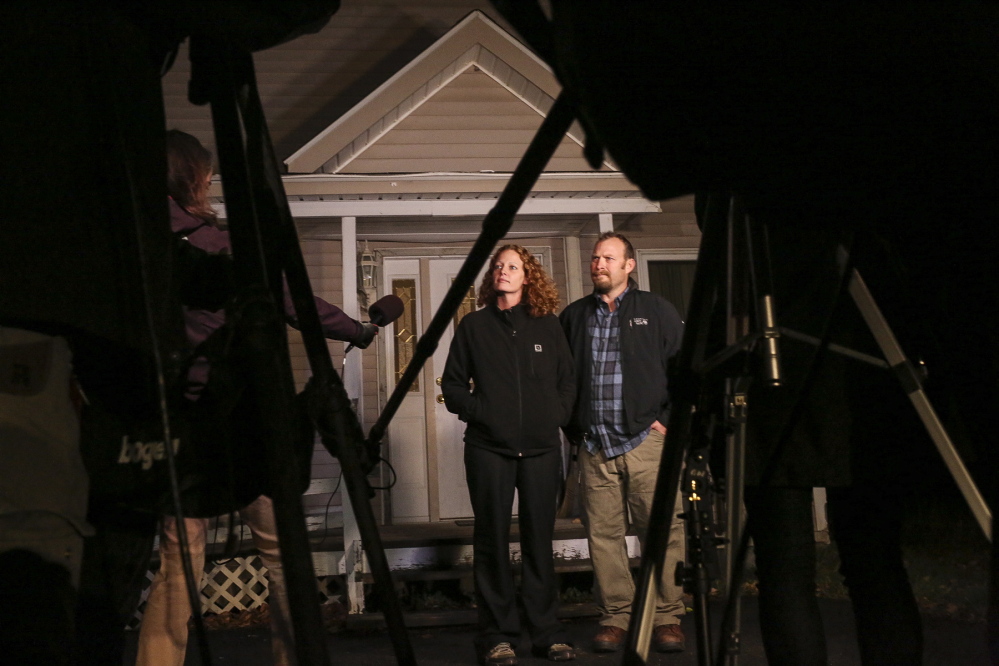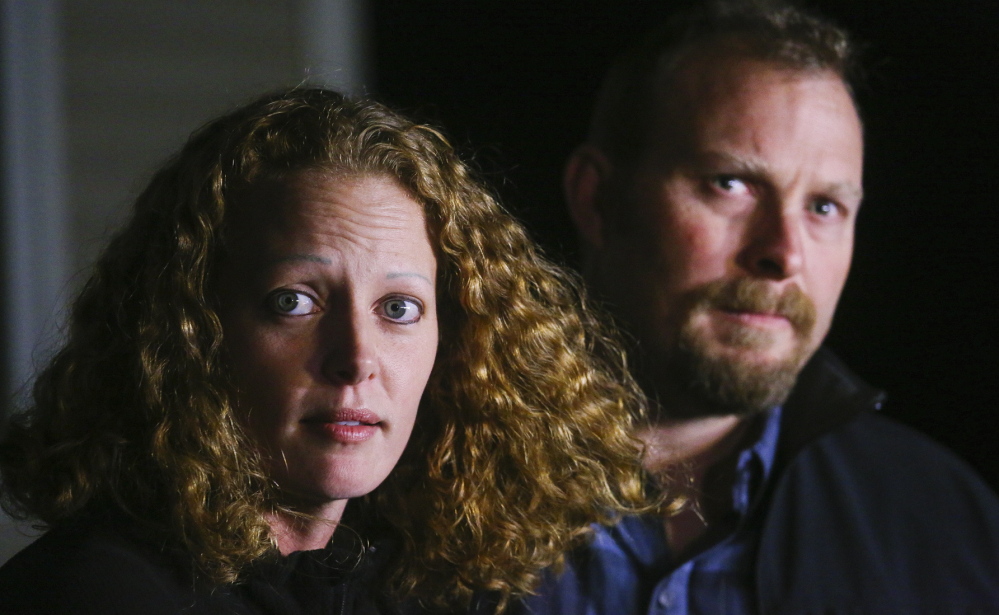FORT KENT — A nurse who treated Ebola patients in West Africa vowed Wednesday to wage a legal battle against Maine’s intention to enforce her quarantine with a court order, but stopped short of saying she would violate any order and leave the home where she is staying.
Kaci Hickox and boyfriend Ted Wilbur addressed the media outside his house here Wednesday night as local and state police watched from across the street.
“We have been in negotiations all day with the state of Maine and tried to resolve this amicably, but they are not allowing me to leave my house and interact with the public even though I am completely healthy and symptom-free,” Hickox said. “I am frustrated by this fact, and I have been told that it is the attorney general’s intention to file legal action against me. And if this does occur, I will challenge the legal actions.”
During a news conference earlier in the day, Maine’s top health official said the state plans to go to court Thursday to enforce the quarantine it has established for any health worker who was treating Ebola patients in West Africa.
Mary Mayhew, commissioner of the Maine Department of Health and Human Services, urged health workers returning from West Africa to abide by state restrictions, which exceed federal guidelines, that are intended to prevent the spread of the disease. If they don’t comply, the state will try to get a judge to order it.
The ultimatum was clearly directed at Hickox, who treated Ebola patients while working for Doctors Without Borders in Sierra Leone.
Mayhew said the state was in the process of filing the court order against Hickox, who had appeared Wednesday morning on “Good Morning America” and “Today” and said she would not abide by the state-ordered quarantine.
“If these restrictions placed on me by the state of Maine are not lifted by Thursday morning I will go to court to fight for my freedom,” Hickox told “Today” host Matt Lauer in an interview via Skype while one of her attorneys, Norman Siegel, was in the studio.
“I’m not going to sit around and be bullied by politicians to stay in my home when I am not a risk to the American public,” she said.
Hickox appeared to backtrack from that stance Wednesday night, saying she didn’t know whether she would follow through on her promise to leave the house where she and Wilbur are staying.
Hickox said she had negotiated with Maine officials in an attempt to “meet them halfway” by making some concessions, such as avoiding public transportation and staying in the Fort Kent area, but the state rejected her terms.
Mayhew said that if a health care worker mingles with the public, then develops symptoms, state health workers would have to track down everyone she had contact with. She said a similar scenario was playing out in New York City, where Dr. Craig Spencer developed symptoms and was diagnosed with Ebola a few days after returning from Guinea, where the disease is rampant and he treated patients for Doctors Without Borders.
Hickox, who returned to the United States on Friday, was visited by a health official Wednesday afternoon. The woman was met outside the house by Wilbur, who had said he was waiting for a representative of the “health department.”
The woman was escorted by a Maine State Police trooper who had been stationed at the house since early Wednesday morning. She entered by a side door, remained inside for two or three minutes, then left.
The woman was not wearing any protective clothing when she entered and left the house. She did not take questions from the media or identify herself.
Under the state’s proposed quarantine rules, Hickox is allowed to have visitors who are not wearing personal protective equipment.
Mayhew previously had said that travelers from West Africa who come to Maine would be monitored for at least 21 days after their last possible exposure to Ebola, including daily check-ins with a state epidemiologist for signs of fever or other symptoms. “Nov. 10 is the last day (of a 21-day quarantine),” she said at Wednesday’s news conference. “That does not seem like a burdensome request to ask, to provide an abundance of protection to her.”
Hickox, who also worked for the U.S. Centers for Disease Control and Prevention, understands the public’s concerns but cited medical science in saying that she does not pose a health risk.
“When someone is asymptomatic, there is no risk for transmitting the infection, so to imprison me in my house for three weeks when you don’t know ahead of time whether I will develop the disease … I’m not willing to stand here and let my civil rights be violated when it’s not science-based,” she said.
State police kept a series of troopers stationed in a cruiser parked across the street from the beige two-story house all day. One of them said police were working with the Maine Center for Disease Control and Prevention to monitor the safety and movements of those in the house. The trooper said Hickox and Wilbur arrived at the house late Tuesday or early Wednesday.
A spokesman for the state police didn’t know what action its trooper are authorized to take if Hickox tries to leave.
Wilbur crossed the street to talk to the police before Hickox came out to speak to the media Wednesday night, to make sure they would not arrest her.
GOVERNOR CALLS FOR COMPLIANCE
Gov. Paul LePage issued a statement Wednesday, saying the state will seek legal authority to enforce the quarantine and accusing Hickox of being unwilling to follow “the protocols set forth by the Maine CDC and the U.S. Centers for Disease Control for medical workers who have been in contact with Ebola patients.”
Federal guidelines, however, do not call for a quarantine of workers like Hickox, according to a posting on the agency’s website, “Interim U.S. Guidelines for Monitoring and Movement of Persons with Potential Ebola Virus Exposure.”
Health care workers who have treated Ebola patients are considered to be at “some risk” of the infection and should be monitored. However, if they show no symptoms, then the restrictions say that state health authorities, “based on a specific assessment of the individual’s situation,” can instruct the person not to use mass transportation or go to public places like shopping malls or movie theaters.
The person can engage in “non-congregate public activities” like jogging in a park, as long as they maintain a 3-foot distance from others, the federal guidelines say.
If a person starts to show symptoms, then they should be isolated and health authorities should be contacted to arrange transportation to a health care facility.
Although Ebola has killed thousands of people in Africa, only one of the four people who have been diagnosed with it in the United States has died.
LePage’s statement said the state was “exploring all of our options for protecting the health and well-being of the health care worker, anyone who comes in contact with her, the Fort Kent community and all of Maine.”
“While we certainly respect the rights of one individual, we must be vigilant in protecting 1.3 million Mainers, as well as anyone who visits our great state,” the statement said.
The office of Maine Attorney General Janet Mills issued a statement that said “the Maine Office of the Attorney General is advising the Maine Centers for Disease Control on the legal avenues available to address the presence of a person in this state who less than three weeks ago was treating people infected with the Ebola virus but who is currently asymptomatic.”
Steven Hyman, also an attorney for Hickox, lambasted the governor’s statement.
“We are filled with misinformation and misstatement of facts by government officials,” Hyman said. “Unfortunately, Gov. LePage seems to be following in the line of some of his predecessors who have gone into this arena,” an apparent reference to Gov. Chris Christie of New Jersey. Christie, a political ally of LePage, has been unapologetic about the four-day quarantine imposed on Hickox in Newark when she first returned from West Africa.
“There is no medical basis to restrain, quarantine or prevent Kaci from going about her life and she is not a threat,” Hyman said.
Medical officials from Northern Maine Medical Center held a news conference at 3 p.m., just minutes before the health official went to visit Hickox.
Hospital CEO Peter Sirois denied that officials called the event as a diversion to allow the worker to visit Hickox with less media present.
Hospital officials shared little new information other than to say that the hospital was open and that patients shouldn’t be deterred from coming in for health care.
Earlier this week, about 10 patients canceled their appointments, citing Hickox’s return to Fort Kent.
“I don’t speak for the Maine CDC, nor do I have any affiliation,” Dr. Michael Sullivan of Northern Maine Medical Center in Fort Kent said when asked about the health worker’s visit to Hickox. “I really can’t comment on whether the levels of quarantine they’ve chosen for her are appropriate.”
‘WE KNOW SHE’S NOT CONTAGIOUS’
Few neighbors in the houses around Wilbur and Hickox’s home on Violette Settlement Road answered their doors Wednesday.
Sandra and Bill Caron, who have lived there for decades, said their opinion on whether Hickox should be allowed to return home changed as they learned more about the Ebola virus.
“We’re educated on it now,” Sandra Caron said. “When this first came out, we didn’t feel like she should come back to Fort Kent.”
Bill Caron, a retired state police trooper, said they changed their minds after hearing statements from Sullivan that Ebola is not contagious if a person is not showing symptoms.
“Now we know she’s not contagious until symptoms arrive,” Bill Caron said. “We know that he is enrolled at the college. And we know that she’s a registered nurse and has been an employee of the CDC, and she’s competent.”
Hickox has been a flash point of controversy since she returned to the U.S. from Sierra Leone on Friday. In New Jersey, officials forced her to stay for three days in an isolation tent outside a hospital, under policies recently implemented in a half-dozen states.
Hickox told George Stephanopoulos on “Good Morning America” that she has no symptoms and should be allowed to monitor her own condition without a quarantine.
“I am absolutely symptom-free and happy to be back in my home in Fort Kent,” she said.
STATE TO MAKE THE NEXT MOVE
Hickox is concerned about the effect of mandatory quarantine policies on other health workers who work overseas.
“We’re just adding to the stigmatization that is not based on science or evidence,” she said on “Good Morning America”.
Her lawyer says the state of Maine has the next move.
“They actually have to move to enforce (the quarantine),” Hyman told Stephanopoulos. “The standard is: ‘Does Kaci have an infectious disease or agent? Does she harbor an infection?’ The answer is no. There is no medical science that says she should be quarantined.”
Outside her boyfriend’s house Wednesday night, Hickox appeared completely healthy. She spoke calmly and even shook the hand of a British reporter, who told her that he would shake her hand after she made a statement that she doesn’t have Ebola and is not contagious.
“You could hug me,” Hickox said. “You could shake my hand. I would not give you Ebola.”
Kennebec Journal Staff Writer Keith Edwards contributed to this report.
Send questions/comments to the editors.

